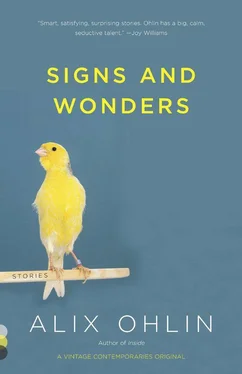Alix Ohlin - Signs and Wonders
Здесь есть возможность читать онлайн «Alix Ohlin - Signs and Wonders» весь текст электронной книги совершенно бесплатно (целиком полную версию без сокращений). В некоторых случаях можно слушать аудио, скачать через торрент в формате fb2 и присутствует краткое содержание. Год выпуска: 2012, ISBN: 2012, Издательство: Random House, Inc., Жанр: Современная проза, на английском языке. Описание произведения, (предисловие) а так же отзывы посетителей доступны на портале библиотеки ЛибКат.
- Название:Signs and Wonders
- Автор:
- Издательство:Random House, Inc.
- Жанр:
- Год:2012
- ISBN:9780307948649
- Рейтинг книги:3 / 5. Голосов: 1
-
Избранное:Добавить в избранное
- Отзывы:
-
Ваша оценка:
- 60
- 1
- 2
- 3
- 4
- 5
Signs and Wonders: краткое содержание, описание и аннотация
Предлагаем к чтению аннотацию, описание, краткое содержание или предисловие (зависит от того, что написал сам автор книги «Signs and Wonders»). Если вы не нашли необходимую информацию о книге — напишите в комментариях, мы постараемся отыскать её.
Signs and Wonders — читать онлайн бесплатно полную книгу (весь текст) целиком
Ниже представлен текст книги, разбитый по страницам. Система сохранения места последней прочитанной страницы, позволяет с удобством читать онлайн бесплатно книгу «Signs and Wonders», без необходимости каждый раз заново искать на чём Вы остановились. Поставьте закладку, и сможете в любой момент перейти на страницу, на которой закончили чтение.
Интервал:
Закладка:
· · ·
By asking directions she was able to find her way to the water, a stream that wound, through various neighborhoods, to the harbor town of Leith. A little wooden sign attached to a stick — something she might, in another mood, have found quaint — pointed the direction and gave the distance. Seeing it, her heart sank. There were miles of path to cover.
But what else was there to do but look? She began to walk, peering, with every step, into the water. Each mossy black stone or floating piece of litter drew her careful inspection. The path changed, as she went, from stone to dirt and back again, rising up to cross city streets, then submerging itself again. Tourists and dog-walkers gave her a wary berth, but her attention didn’t waver. The long green tendrils of trees were reflected palely in the water. She saw no fish, no life at all.
After around an hour she became distantly aware that a man behind her was observing her every move. Now that she noticed him, she realized he’d been there for quite a while. She wasn’t afraid of him, only annoyed to be distracted. Without hesitating, she spun around and said, “What do you want?”
He was in his late twenties and wearing a nondescript outfit: brown corduroys, blue shirt, darker blue windbreaker. His pale face had a ruddy, windswept look, and he only lifted his eyebrows, apparently unruffled.
“Good afternoon, madam,” he said. “My name is Lieutenant John McCrary.”
“You’re a policeman,” she said. She was pleased: another pair of eyes to help. “I’m looking for my son. You can help if you want.”
McCrary fell in step beside her. After a few quiet minutes he said, “I understand he’s in fact your stepson?”
His tone was so soft that she almost missed the accusation in it. “Yes, that’s right,” she said. “His parents are divorced. His mother’s on her way to Edinburgh, flying in from New York.”
“And you’ve come to look for him here, because …”
Judith sighed. They were wasting time. “Because I have a hunch. You’ve heard of a hunch?” She stopped and spread her palms in appeal. “Anyway, it’s just good to do something. ” She could hear herself trying to sound reasonable, convincing, despite the subtle tremor in her voice.
“This hunch you have,” McCrary said, still softly, “where did it come from?”
She saw, then, what he meant: that only the guilty have secret knowledge of any crime. Standing before him, with the damp air cooling her cheeks, she felt his indictment join Jason’s and Molly’s. A mother might have an intuition, but the stepmother could only be the villain. That’s how fairy tales go.
“If I could tell you where it came from,” she told him, “it wouldn’t be a hunch. Anyway, believe whatever you want. Follow me if you have to. I really don’t care.”
Another hour passed with she and McCrary walking together, a walk that in another context might have been romantic — the low-hanging branches, the glimmer of birdsong, the old buildings hunkering over the water. She experienced these things as quick flashes, whenever she momentarily turned away from the water to rest her eyes. McCrary said nothing, though she felt him watching her, and it angered her that he wasn’t paying more attention to the water.
She thought she saw Lucas, but it was a soda can, or a seagull. She thought she saw him, but he wasn’t there.
It was three o’clock when they reached the harbor at Leith at the end of the walk. She could go no farther. In front of her was the sea. She hadn’t found him; he was out there somewhere all alone, and she had failed. She stood staring at the spot where the gray water met the gray sky. The wind was cold and her tears stung her face and her heart ached for him.
She stood there for so long that McCrary, apparently, lost patience. She sat down on a rock and, glancing up, noticed that he was gone. Though she’d resented his accusing presence, she felt abandoned by his departure. Now she, too, was alone. Somewhere in the city, Jason and Molly were probably still walking the streets, the closes and mews, calling Lucas’s name.
Then she saw him.
In the gray water his dark blue sweatshirt looked like a rock or a wave. It was the movement of his hair across his cheeks that caught her eye, an image that recalled, exactly, the dream she’d had on the plane.
He was in the water below a pier, where a kid could easily have fallen off while looking down. Without thinking, she threw herself in and swam out to him. It took her longer than she expected and she was already tired by the time she got close to him. Catching him was yet another difficulty; she was calling his name but couldn’t tell if he heard her.
Then she was wrapping him in her arms and heading back to shore. She didn’t know if he was conscious, or even alive. His arms and legs were stiff and she could barely make any progress, holding him with one arm and paddling with the other. She swallowed some water and lost a contact lens, the world now a blur of waves. She could no longer see land and seemed to be caught in a current, or was she almost there? She had one hand beneath his sweatshirt and his bare back didn’t feel human; cold, inert, it barely felt like anything at all.
She swallowed more water and was choking and couldn’t breathe when miraculously, his arms circled around her. He was strong and holding on, and with both hands free she knew they’d make it. She knew, too, that the dream she’d had on the plane had been only part of the premonition, that the stretcher also figured in it: a stretcher that could carry Lucas home again, to health, to safety, to his father and sister and mother.
McCrary, who’d gone off to find a restroom and a sandwich, and who swore to his superiors that he’d been gone for less than fifteen minutes, discovered them on the beach. Lucas was crying and shivering. Judith wasn’t breathing. She’d worked one arm inside the sleeve of his sweatshirt, apparently and correctly believing that this would bind them together. Trained in CPR, the policeman did his best, but couldn’t revive her; the ambulance came, but not in time.
“I was lost,” Lucas said, “and I kept getting more lost no matter what I did.”
He’d only walked off for a couple of minutes; he was upset about something, he couldn’t even remember what. He was afraid they’d be mad at him for walking away. And he was too afraid to talk to strangers, because he’d always been told not to. Then he was both tired and confused. He’d spent the night huddled in an alley, crouched inside his sweatshirt.
His father asked him question after question: Where did you go next? Why didn’t you ask a policeman? And he asked one question over and over again: How did she find you?
The boy had no answer. Only nine, he didn’t have the words to explain any of this mystery, how it had happened or what it meant, what it was like for him to be there in the water, blind and frenzied and drowning, and for the woman to somehow come to him, as if out of nowhere, and carry him ashore.
The Idea Man

Beth met Fowler at a party of sensible adults. She was divorced, her children were in grade school, and she had started to collect antique milk glass. She’d inherited a few pieces from her aunt and was now adding to the collection, rows of pale, frilly jars and gravy boats on her kitchen shelves. Why collect glass? Because it was there. It provided the only available momentum in a life that was losing speed. The party was full of other divorced people, eyeballing what they might be forced to settle for the second time around. When Fowler came in, the energy in the room crackled. He was wearing black jeans, a dirty white button-down shirt, and a sweater vest. His hair was long and tangled. He was very tall and too thin, as if he’d been starved or rack-stretched.
Читать дальшеИнтервал:
Закладка:
Похожие книги на «Signs and Wonders»
Представляем Вашему вниманию похожие книги на «Signs and Wonders» списком для выбора. Мы отобрали схожую по названию и смыслу литературу в надежде предоставить читателям больше вариантов отыскать новые, интересные, ещё непрочитанные произведения.
Обсуждение, отзывы о книге «Signs and Wonders» и просто собственные мнения читателей. Оставьте ваши комментарии, напишите, что Вы думаете о произведении, его смысле или главных героях. Укажите что конкретно понравилось, а что нет, и почему Вы так считаете.












